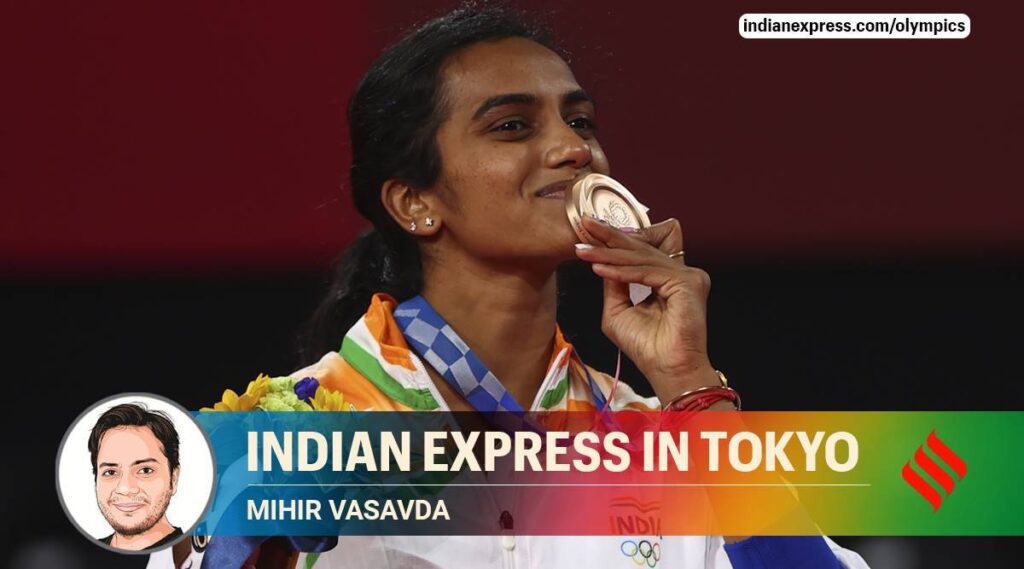Bronze medallist P.V. Sindhu of India poses with her medal. (Reuters Photo)
Sindhu became only the second Indian athlete after wrestler Sushil Kumar — and the first woman from the country — to win two individual Olympic medals, dispatching China’s He Bingjiao 21-13, 21-15 to win the bronze medal at the Tokyo Games.
In the end, it felt strangely straightforward.
Playing an opponent who was fast, fit and tricky, P V Sindhu rose to the occasion like she usually does to turn her bronze medal playoff, which was expected to be a humdinger, into a no-contest.
Sindhu became only the second Indian athlete after wrestler Sushil Kumar — and the first woman from the country — to win two individual Olympic medals, dispatching China’s He Bingjiao 21-13, 21-15 to win the bronze medal at the Tokyo Games.
She also ensured India’s third medal of this Olympics — after the silver for weightlifter Mirabai Chanu and the assured bronze for boxer Lovlina Borgohain.
Sindhu didn’t immediately realise all of this, though. As a backhand tap landed beyond her rival’s reach to seal the match, the Indian ace looked blankly at her coach, Park Tae San. It was only after the coach erupted in joy that the shuttler, too, let out a roar. “It still hasn’t sunk in,” Sindhu said, her voice quivering.
The glitter of bronze might not match the shiny silver she won in Rio, but Sindhu’s second medal is significant for multiple reasons.
It comes in what is universally regarded as the golden era for women’s badminton, with contenders from half-a-dozen countries capable of winning on their day. Sindhu, a big-tournament player, experienced that herself on Saturday when, after dispatching home favourite Akane Yamaguchi with disdain, she was handed the same treatment by Chinese Taipei’s Tai Tzu Ying in the semifinal.
That loss had left Sindhu reeling. “I didn’t know if I should be sad that I lost a chance to play the final, or be happy that I have another shot at a medal,” she said.
But then, coach Park reminded her of the joy of standing on the podium, never mind the colour of the medal, and the heartbreak of finishing fourth. It didn’t help, however, that she had to wait the entire day on Sunday to play her medal match, which started at 8.30 pm Tokyo time.
“I woke up, did my stretches, had breakfast and came back to my room. But constantly, I was just thinking about the match. You have to let go of everything and be calm but that did not happen for me today,” she said.
The 40-minute bus journey from the Olympic village to the Musashino Forest Sports Plaza was spent in anxiety. But the minute she stepped on the court, she had her beast-mode on, not showing any signs that the semifinal defeat still hurt her. And the 26-year-old went on to raise the bar with a near-perfect performance, which was the only way to beat a tricky, left-handed opponent who had slayed giants en-route to the bronze medal playoff.
He Bingjiao had been ruthless with her lightning-quick jump smashes, never letting a rival off the hook once she’d taken the lead. She started the same way this time, using her incredible speed to put Sindhu under pressure, not allowing her to control the rallies.
But mid-way through the opening game, Sindhu found her stride and began to pin her rival to the rear court backhand, forcing her to go for lofty overhead shots and not giving any opportunity or space for those deadly smashes.
The Chinese challenger tried to counter Sindhu with fierce body smashes but, as she had shown against Yamaguchi in the quarters, the Indian found ways to negotiate what was once her weaker link.
Dodging the shuttle by swaying sharply, Sindhu has shown time and again through this campaign the ability to not just defend the shot but convert it into an instant counterattack by finding sharp angles on her return — as she did at 17-11 in the opening game to deflate He’s confidence.
Sindhu wrapped up the first game without any fuss. The Chinese tried to engage her in longer rallies in the second, but Sindhu remained patient. The scores remained neck-and-neck until the mid-game break, like it was in the first game as well. But then, Sindhu ran away with the match with delightful around-the-head cross-court drops.
Then came that final roar.
This medal was significant, she said, also because of all the expectations. “I would say this medal was tougher than the one I won in Rio,” Sindhu said. “But if I can do it, anyone can.”
Article Credit: indianexpress
